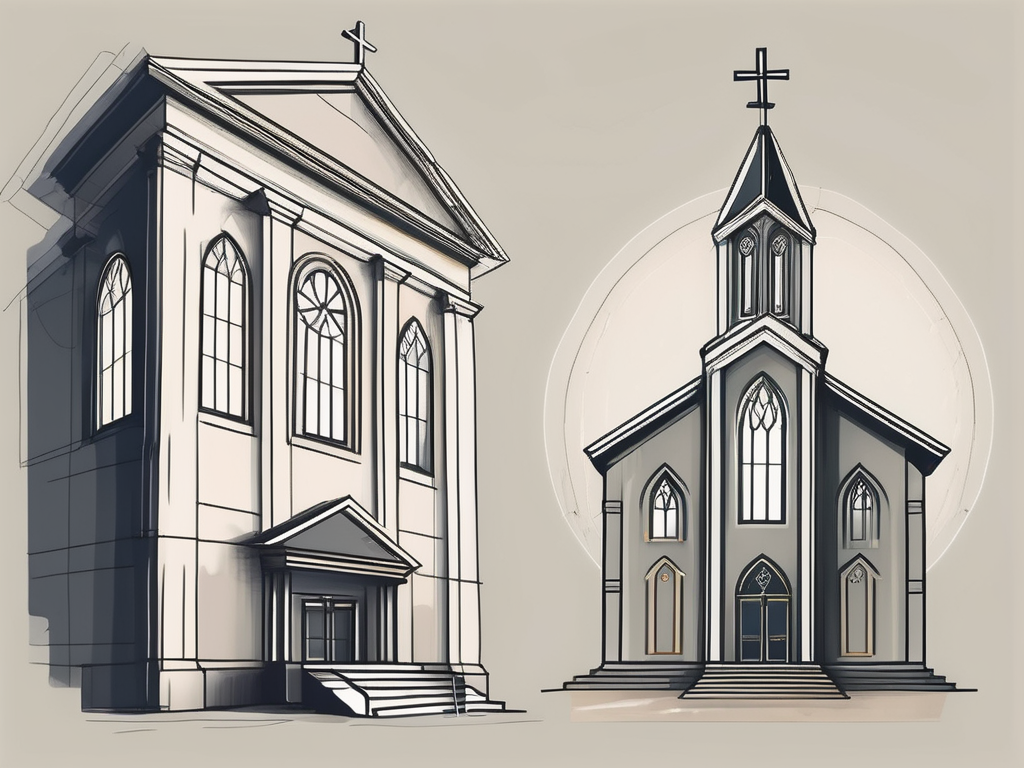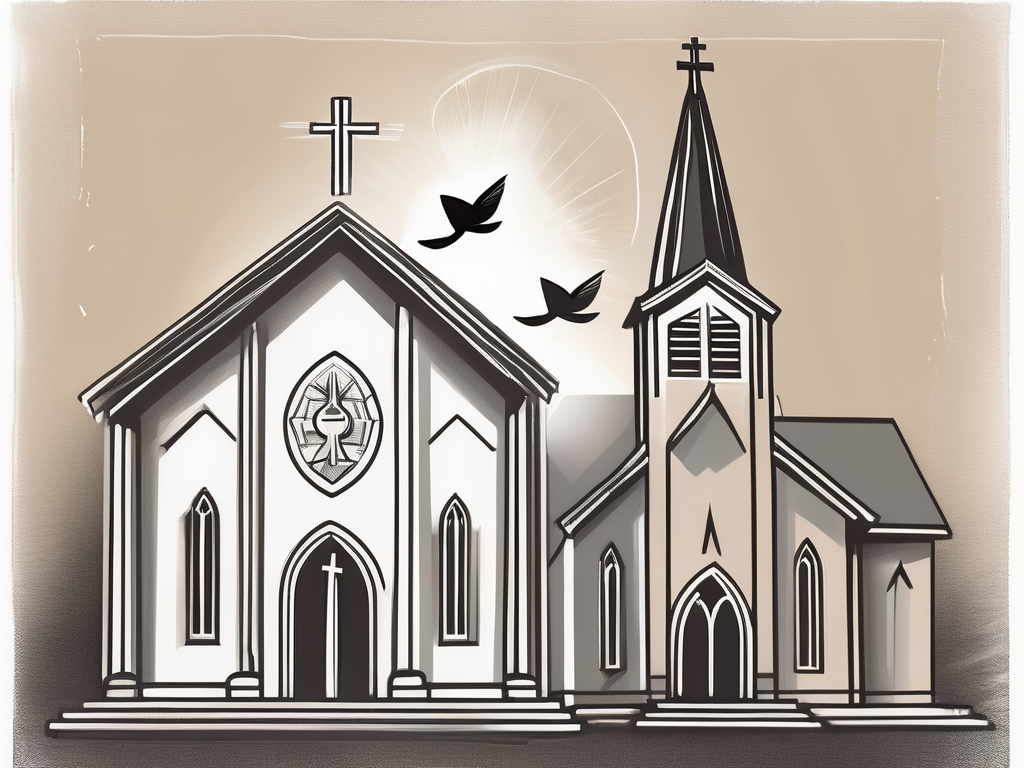In the world of Christianity, there are numerous denominations and sects, each with its own distinct beliefs and practices. Two prominent branches within Christianity are the Baptist and the Pentecostal churches. While both share a common faith in Jesus Christ, there are notable differences that set them apart. In this article, we will take a closer look at the Baptist and Pentecostal faiths, their history, beliefs, worship styles, and perspectives on the role of the Holy Spirit.
Understanding the Baptist Faith
The Baptist faith is a rich and diverse tradition that has its roots in the belief in salvation through faith in Jesus Christ alone. This core belief sets Baptists apart and forms the foundation of their theology and practice. Baptists firmly believe that salvation is a personal experience, and it is through faith in Jesus Christ that individuals are reconciled with God.
Central to the Baptist faith is the authority of the Bible. Baptists consider the Scriptures to be the ultimate guide in matters of faith and practice. They believe that the Bible is the inspired Word of God, and it provides the blueprint for living a life that is pleasing to Him. Therefore, Baptists emphasize the importance of studying and understanding the Scriptures, as they believe it is through the Word of God that individuals can discern His will for their lives.
Key Beliefs and Practices
One of the distinctive practices of the Baptist faith is adult baptism by immersion. This act symbolizes the believer’s identification with Jesus’ death, burial, and resurrection. Baptists view baptism as a public declaration of one’s faith and a step of obedience to Christ’s command. By being fully immersed in water, believers demonstrate their commitment to following Jesus and their desire to live a transformed life.
In addition to baptism, Baptists also practice the Lord’s Supper, also known as communion or the Eucharist. This sacrament is seen as a symbolic representation of Christ’s sacrifice on the cross and serves as a reminder of His redemptive work. Baptists believe that partaking in the Lord’s Supper is an act of worship and a time of spiritual reflection.
Historical Background of the Baptist Church
The Baptist Church has a rich historical background that can be traced back to the 17th century during the Protestant Reformation. It emerged as a result of individuals seeking to reform the Church and restore the beliefs and practices they found in the New Testament.
Key figures like John Smyth and Thomas Helwys played a significant role in the establishment of the Baptist Church. They were passionate advocates for religious freedom and the separation of church and state, which became defining principles of the Baptist faith. These early Baptists believed that individuals should have the freedom to worship according to their own conscience, without interference from the government or any other religious authority.
Over the centuries, the Baptist Church has grown and evolved, adapting to different cultural contexts and engaging in various social and political issues. Today, there are numerous Baptist denominations and associations worldwide, each with its own unique characteristics and emphases.
Role and Structure of the Baptist Church
The Baptist Church is known for its congregationalist structure, which means that each local church has autonomy in decision-making and governance. This congregational governance is based on the belief that the local church is the primary expression of the body of Christ and that its members should have a voice in the affairs of the church.
Leadership within the Baptist Church typically consists of ordained pastors, deacons, and lay leaders. The pastoral role is focused on teaching and preaching the Word of God, and pastors are seen as spiritual guides and shepherds of the congregation. Deacons, on the other hand, serve as servant-leaders, providing practical support and assistance to the church community. Lay leaders, who are not ordained, play various roles in the church, such as leading ministries, organizing events, and serving in administrative capacities.
Together, these leaders work collaboratively to ensure the spiritual growth and well-being of the church. They seek to create an environment where individuals can deepen their relationship with God, grow in their understanding of the Scriptures, and actively engage in the mission of the church to share the love of Christ with others.
Delving into Pentecostalism
Pentecostalism is a vibrant and dynamic branch of Christianity that has gained significant popularity and influence in the 20th century. With its core beliefs and practices centered around the Holy Spirit, Pentecostals bring a unique perspective to the Christian faith.
Core Beliefs and Practices
At the heart of Pentecostalism lies a deep belief in the full inspiration and authority of the Bible. Pentecostals view the Bible as the ultimate guide for faith and practice, and they strive to live their lives in accordance with its teachings.
One of the distinctive aspects of Pentecostalism is its strong emphasis on the person and work of the Holy Spirit. Pentecostals believe that the Holy Spirit is actively at work in the world today, empowering believers to live a life of holiness and to carry out the mission of the church.
A central experience in Pentecostalism is the baptism in the Holy Spirit. This experience is often accompanied by speaking in tongues, which Pentecostals view as a sign of spiritual empowerment. Speaking in tongues is seen as a direct communication between the individual and God, and it is believed to edify the believer and strengthen their relationship with God.
In addition to the baptism in the Holy Spirit, Pentecostals also believe in the gifts of the Spirit mentioned in the New Testament. These gifts include prophecy, healing, and miraculous powers. Pentecostals see these gifts as essential for effective Christian ministry and the edification of the church. They believe that these gifts are not limited to a select few but are available to all believers who seek them.
Historical Roots of the Pentecostal Church
The roots of the Pentecostal movement can be traced back to the early 20th century. It emerged as a revival within the Christian faith, drawing inspiration from various denominations and seeking to recapture the spiritual experiences described in the New Testament.
One of the key events in the development of Pentecostalism was the Azusa Street Revival in Los Angeles, California. Led by an African-American preacher named William J. Seymour, this revival became a catalyst for the spread of Pentecostalism. The Azusa Street Revival was marked by fervent prayers, charismatic worship, and experiences of glossolalia, or speaking in tongues.
From the Azusa Street Revival, Pentecostalism quickly spread across the United States and eventually reached other parts of the world. Today, Pentecostal churches can be found in almost every country, with millions of believers embracing this vibrant expression of Christianity.
Role and Structure of the Pentecostal Church
Like the Baptist Church, Pentecostal churches have a congregationalist structure. This means that the local congregation holds authority and makes decisions collectively. The voice of each member is valued, and the congregation plays an active role in shaping the direction and activities of the church.
The leadership in Pentecostal churches consists of pastors, elders, and other appointed leaders. These leaders are recognized for their spiritual gifts and their ability to lead and guide the congregation. They provide pastoral care, teach the Word of God, and facilitate the worship and ministry of the church.
Pentecostal churches are known for their vibrant worship services, characterized by passionate singing, expressive worship, and an openness to the moving of the Holy Spirit. The atmosphere is often filled with joy, excitement, and a sense of expectancy as believers gather to encounter God and experience His presence.
In addition to regular worship services, Pentecostal churches also place a strong emphasis on evangelism and missions. They believe in the Great Commission given by Jesus to go and make disciples of all nations, and they actively engage in spreading the message of the Gospel both locally and globally.
Overall, Pentecostalism offers a rich and diverse spiritual experience for its followers. With its emphasis on the Holy Spirit, spiritual gifts, and the authority of the Bible, Pentecostals seek to live out their faith in a way that is both authentic and transformative.
Comparing Baptist and Pentecostal Beliefs
Similarities in Doctrine
Despite their differences, both Baptist and Pentecostal churches are united in their belief in the triune nature of God, the divinity of Jesus Christ, and the essential nature of salvation through faith in Christ.
Both denominations also place a strong emphasis on the Bible as the Word of God and believe in the necessity of a personal relationship with Jesus Christ.
In Baptist churches, there is a deep reverence for the Scriptures. The Bible is seen as the ultimate authority and guide for faith and practice. Baptists believe that the Bible is inspired by God and is without error. They believe that it contains all that is necessary for salvation and godly living.
Pentecostals, too, hold the Bible in high regard. They believe that the Scriptures are inspired by the Holy Spirit and that they are the infallible and authoritative Word of God. Pentecostals believe that the Bible is not only a historical document but also a living and active word that speaks to believers today.
Differences in Theology
One notable theological difference between Baptists and Pentecostals is their view on the gifts of the Holy Spirit. While both believe in the gifts mentioned in the New Testament, Pentecostals place a greater emphasis on the ongoing manifestation of these gifts, while Baptists tend to approach them with caution and may place more focus on the fruit of the Spirit.
Pentecostals believe in the continuation of the gifts of the Holy Spirit, such as speaking in tongues, prophecy, and healing. They believe that these gifts are available to all believers and are meant to edify the church and empower believers for ministry.
On the other hand, Baptists believe that the gifts of the Holy Spirit are still active today but may not be as prevalent as they were in the early church. They believe that the primary evidence of the Holy Spirit’s work in a person’s life is the fruit of the Spirit, which includes love, joy, peace, patience, kindness, goodness, faithfulness, gentleness, and self-control.
Another difference lies in the practice of baptism. Baptists baptize believers by immersion, whereas Pentecostals may practice various forms of baptism, including sprinkling or pouring.
Baptists view baptism as an outward symbol of an inward change. They believe that baptism is an act of obedience and a public declaration of one’s faith in Jesus Christ. Baptism by immersion symbolizes the believer’s identification with the death, burial, and resurrection of Jesus.
Pentecostals, on the other hand, believe that baptism is an important step in the believer’s journey of faith but may not place as much emphasis on the mode of baptism. They believe that baptism is a means of receiving the Holy Spirit and being initiated into the body of Christ.
While these differences exist, both Baptist and Pentecostal churches share a common goal of worshiping and serving God, spreading the Gospel, and living out their faith in their daily lives.
Worship Styles: Baptist vs Pentecostal
Baptist Worship Practices
Baptist worship services typically involve congregational singing of hymns or contemporary worship songs, accompanied by instruments such as pianos, organs, or guitars. Preaching plays a central role, with sermons focusing on biblical teaching and practical application to everyday life.
Baptists place importance on reverence and order in worship, often following a structured liturgy. Prayer, Scripture reading, and congregational participation are integrated throughout the service.
Pentecostal Worship Practices
Pentecostal worship is characterized by exuberant praise and an emphasis on the direct experience and encounter with the Holy Spirit. Music is vibrant and lively, with a blend of contemporary worship songs and spiritual songs that invite spiritual expression.
During Pentecostal worship, spontaneous prayer, personal testimonies, and the manifestation of spiritual gifts may occur. There is often a sense of freedom and spontaneity, allowing for greater participation and the possibility of healing and deliverance.
Role of the Holy Spirit in Baptist and Pentecostal Churches
Baptist Perspective on the Holy Spirit
Baptists believe in the work of the Holy Spirit in the life of the believer, but they tend to focus more on the indwelling presence of the Holy Spirit rather than the outward manifestations. They see the Holy Spirit as a guide, comforter, and helper in one’s spiritual journey.
Baptists value the fruit of the Spirit, emphasizing the development of character qualities such as love, joy, peace, patience, kindness, goodness, faithfulness, gentleness, and self-control.
Pentecostal Perspective on the Holy Spirit
Pentecostals highlight the ongoing supernatural work of the Holy Spirit and believe in the baptism of the Holy Spirit as an empowering experience for ministry. They view the Holy Spirit as the source of spiritual gifts, divine guidance, and transformative encounters with God.
Pentecostals actively seek the fullness of the Holy Spirit in their lives, desiring spiritual intimacy and a deep connection with God’s power and presence.
In conclusion, the Baptist and Pentecostal churches may share a common faith in Jesus Christ, but they differ in their beliefs, practices, worship styles, and perspectives on the role of the Holy Spirit. Each denomination brings its unique contributions to the body of Christ, reflecting the diversity within Christianity. Understanding these differences can foster respect, dialogue, and collaboration among believers from various backgrounds as we continue to seek God’s truth and build His kingdom on earth.












